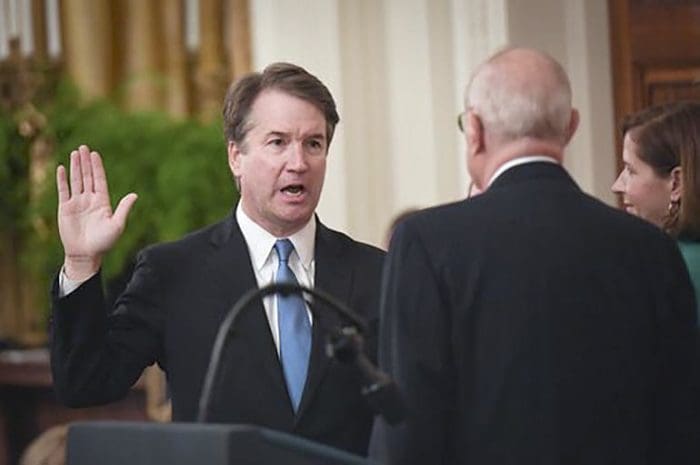Many on the pro-gun rights side have been tearing their clothes and singing meet the new boss, same as the old boss, after the news came down yesterday that the Supreme Court, now featuring Justice Kavanaugh, refused to hear an appeal of a Ninth Circuit “may issue” ruling that held sheriffs can refuse to issue permits as they see fit.
The court on Monday, without comment, left intact lower-court rulings against two Sacramento County residents who were denied concealed-gun permits more than a decade ago. They challenged the California law that lets county sheriffs decide whether to issue the permits and claimed that in Sacramento County, the sheriff reserves handgun licenses for political supporters. …
The Ninth U.S. Circuit Court of Appeals in San Francisco upheld the state law in 2016 and said the Second Amendment does not include a right to carry concealed handguns in public. The Supreme Court denied review of the case in June 2017 over the dissidents of Justices Clarence Thomas and Neil Gorsuch, who said, in Thomas’ words, that Second Amendment rights were not limited to “carrying a gun from the bedroom to the kitchen.”
Friend of TTAG and distinguished barrister LKB suggests we all take a deep breath and has this advice regarding the court’s refusal to jump in on this one:
What non-practioners often fail to grasp is how truly hard it is to get the Supremes to grant cert on anything, even where there is a clear conflict between the circuits over obvious federal law issues. Except for truly exceptional cases, the SCOTUS just does not grant a cert petition if there are procedural nits to be picked with the case. That’s just the way it is.
As I mentioned here in this post, the Rothery case had no small number of procedural hickeys that made it a less-than-ideal test case. Thus, while I’m disappointed with the decision to deny cert on it, I’m not surprised.
Similarly, while the instant case has some awful dicta and reasoning, it also appears to have some procedural issues that I suspect may make it less than an ideal cert candidate.
Roberts and likely Kavanaugh are going to want to wait for an ideal 2A test case. Best bet right now is New York State Rifle and Pistol Association v. City of New York, given that the NYC laws are so draconian as to amount to a blanket denial of 2A rights. We should have a decision on whether they will hear the case early next year.
It’s always been extremely hard to get the Supreme Court to take any case — even ones that don’t present procedural “outs” — and that reality isn’t going to change.
Another case to watch right now is Young v. Hawaii. Rumblings I’m hearing indicate that the Ninth Circuit Court of Appeals is not likely to grant en banc reconsideration, because they are afraid that doing so and reversing the panel opinion would likely present an ideal 2A test case for Supreme Court review. [Young, like Heller and MacDonald, is a near-perfect plaintiff for a 2A test case.]
On the other hand, the appeal in the Young case was originally filed with the Ninth Circuit in 2012 . . . so I won’t be surprised if the anti-2A forces just try to avoid things by stringing it out for a few more years rather than actually decide it one way or another. (Hot legal topic right now is whether the Young opinion is binding precedent in Ninth Circuit unless or until en banc rehearing is ordered.)
I believe that the day of reckoning for the anti-2A forces is coming. Roberts being Roberts (and I think he’s going to be the key vote given the current composition of the Court), he’s going to want a near-perfect test case before he’ll enforce/expand Heller. There are several in the pipeline that might do the job.
My prediction is that whatever case they take, Roberts writes a narrow opinion that declares that laws that impinge 2A rights are subject to strict scrutiny, and kicks the case back down for determination under that standard. (Thomas will write a blistering concurrence joined by 2-3 others saying that there’s no need to send it back, as there is no way the law in question survives strict scrutiny.)
While frustratingly narrow, that kind of incrementalist ruling would nuke just about all the Heller-agnostic Court of Appeals rulings out there (which typically hold that 2A challenges get only intermediate scrutiny or rational basis review), and make it very hard for district and circuit judges to continue to wink at Heller. When laws are subject to “strict scrutiny” constitutional analysis — for example, laws that impose prior restraints on free speech — almost never survive the challenge.
Now, were we to get a solid pro-2A replacement for Ginsberg/Breyer/Sotomayor in the near future, then this calculus changes radically. Thomas would then have the votes for a broader ruling, and as the senior judge in the majority (assuming Roberts wimps out) Thomas would almost certainly pull rank and assign the writing of the Court’s opinion to himself. And Thomas’ 2A creds are second to none.
